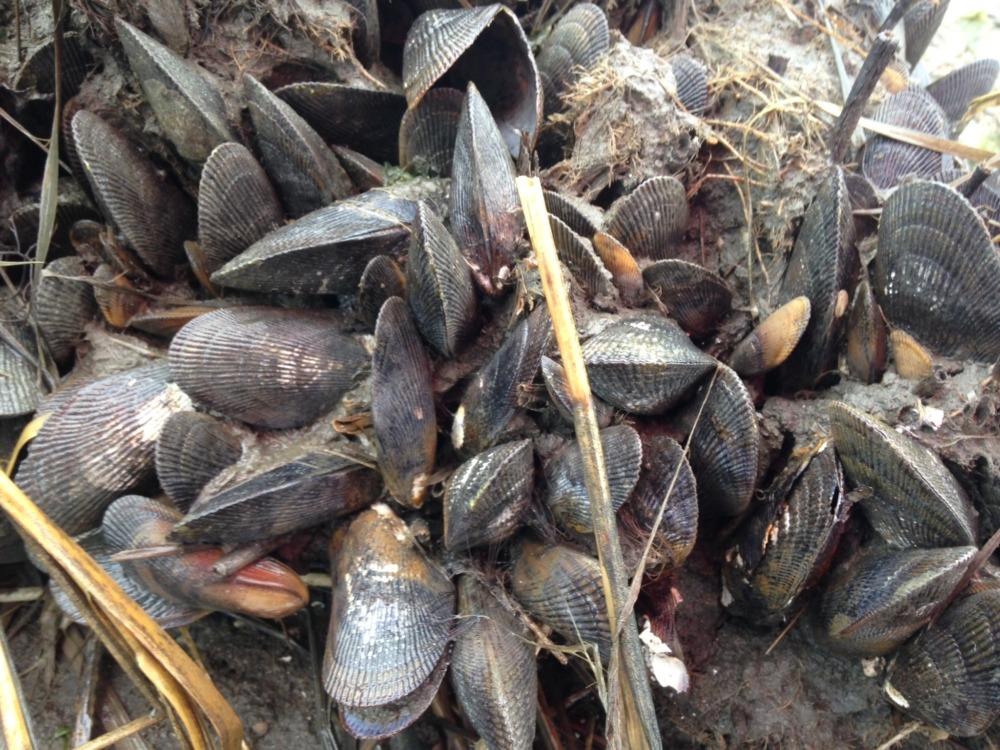by Angela Capinera
Your Mind in Bloom, LLC
Next time you go swimming in the waters off of Stratford, thank an Atlantic Ribbed Mussel, Geukensia demissa. Each one of these Atlantic Ribbed Mussels silently filters between 15 and 30 gallons of water daily (about the volume of one large garbage can). Yes, each one of these little animals whose shells we might stuff in our pockets filters that much water each day while it is alive. Individual mussels can live up to 15 years on average so during their individual life span, they can filter around 164,250 gallons of water in their lifetime. Now take that for one and multiply that by the thousands (or maybe a million plus?) here in Stratford alone. They are hard to count individually.
Geukensia (Latin for “of the family of marine bivalve mollusks) demissa (“low-lying” in Latin)
Family: Mytilidae (true mussels)
Bivalve: “bi” – 2, 2 valves or Latin for 2 sided or folding doors
A few good reasons to love Geukensia demissa, or the Atlantic Ribbed Mussel.
Geukensia demissa do such an awesome job of filtering water there have been pilot programs where they are placed on “barges” made of wiring so they can filter water going through heavily polluted waterways and they significantly improved the water quality and saved municipalities, especially ones adjacent to rivers, money on water filtration programs.
Geukensia demissa filter water through 2 siphon tubes inside their “body” during high tides. During low tide, they close up their shell tightly with their miniscule teeth that latch both sides of the shell together. Filtration happens during high tide when they unlatch their teeth, open their shells, and the siphons “reach out” and filter water through. They mainly filter nitrogen (usually the result of fertilizer runoff) out of the water yet they also filter other pollutants, including heavy metals like lead and arsenic. Their main source of natural food is plankton and algae.
Atlantic Ribbed Mussels live in salt marshes and mud flats along the Atlantic seaboard in a symbiotic and necessary relationship with Sporobolus alterniflorus (Spartina). Spartina and Atlantic Ribbed Mussels need their symbiotic relationship, where both are involved yet neither is harmed, for survival. Spartina provides the rhizome root structure for the Atlantic Ribbed Mussels to latch their byssus threads to. The byssus threads grow mainly out of the bottom of the mussel and can attach not only to roots yet rocks and other hard surfaces, including other shells, as well. The byssus threads help the mussels attach in clumps as well and also helps Atlantic Ribbed Mussels spawn during the summer as well. As a result of this these mussels also help secure Stratford’s coastline from erosion. Again, without them, our town would be very different.
Atlantic Ribbed Mussels are often confused with their cousins, the Blue Mussel, due to their blue-purplish-brownish color. Yet the easiest way to tell them apart are the ridges. Like trees, they have one ridge for each year they have lived. Their shell is made of calcium carbonate, the same element we have in our bones. The mussel part is also tougher. While I have seen people harvesting them (I wouldn’t recommend eating them at all), their “meat” is tougher and has a different taste from the Blue Mussel.
Environmentally, they are considered a “stable” species. They are eaten by birds, raccoons, and different species of crabs. I have noted in Great Meadows where one week there are secured beds along the roots of Spartina, and the next week, numerous beds have been noticeably removed. Animals only take a few. If people remove them, this will directly impact the saltmarsh Spartina grasses, and sooner rather than later, will impact the marsh’s ability to control erosion, prevent flooding, and filter the water.
Yes, these Atlantic Ribbed Mussels are “free”, yet when people take them to sell to food distributors they are taking a stable resource away from all of us with no giveback and nothing there for reproduction.
The same occurs when I’ve seen people take them out of the channel adjacent to Short Beach. The water goes into the channel, gets filtered, and then comes out much cleaner that benefits all species that use the beach. If the Atlantic Ribbed Mussels disappear from either spot, or any other location where they can be found in Stratford, we are all in trouble. Please leave them alone and let them thrive.
Thank you. Many blessings. Have an awesome day.
“Never confuse Motion with Action.” – Benjamin Franklin
Note: In the accompanying photo, the juveniles are the smaller, orange/ yellow colored ones.

